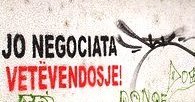The Ahtisaari Package
The document is being currently discussed in Vienna between Kosovo and Serbia although compromise appears unrealistic since Serbia refused the proposal as a whole. Hence, it leaves many difficult bites for the Albanian majority to swallow.
The document as a whole clears out of the picture Serbia’s sovereignty over Kosovo. Getting the right to sign and ratify international agreements, its recognized security forces as well as competences over foreign affairs clarify Kosovo’s subjectivity in the international arena. However, Kosovo’s own sovereignty and control are strictly monitored by the International (ESDP) Civil Representative.
Overall, the functionality of the Kosovar state is not endangered. However, change (especially to the legislation) will be one of the toughest challenges for the transition period. One of these difficult bites includes the fact that the document goes as far as giving inter-municipal cooperation a broad autonomous connotation when allowing the establishment of a decision-making body to operate above any group of municipalities. Creating this mid-level of governance, may imperil communication between center and the local level by uncooperative municipalities.
Although presenting Kosovo as a “multi-ethnic society”, the document fails to mention the term ‘Albanian’ in any instance which may be understood as negligence of the Albanian identity in Kosovo, even thouh this constitutes 90 % of the country. In addition, there is a fine line between securing the safety of ethnic groups and isolation of the same. In the short run, the division for the Kosovo Serb minority and the security measures around Orthodox religion sites may seem the best solution. However this way of social development will seriously hamper reconciliation efforts in the long-run.
‘Vetevendosja’ Protests
The freedom and functioning of an opposing stream, challenging the main political movements, presents a core foundation for the striving democracy in Kosovo. Preserving and developing such inner drive should not be only a “civil society” mission but deserves special attention from Kosovo’s institutions as well. The 120 days transition period, when the status Settlement will be implemented, will bring to the surface varieties of economic, social and other disappointments and dissatisfactions. Thus protests and demonstrations must finally be understood for what they are, a clear visage of what the society feels whether it suits the political scene or not. In this regard, Kosovo’s institutions have to learn to rely on their (own) pool of responsibility. The February ‘Vetevendosja’ (Self-determination) movement protests, once again, proved the existence of this quite fragile façade over the political and social situation. The tragic outcome of the violence in these protests with the death of two young protesters, killed by police bullets, should continue to be a burden to all institutions involved (UNMIK, Kosovo police, government as well as ‘Vetevendosja’ itself) until the investigations on this case are final and public. For once, taking responsibility should prevail over immunity and the “for the sake of the status-quo” excuse.
Kosovo’s transition period will be the crucial challenge for the international community in general and the EU in particular. Thus, a Security Council decision, opening the way for Kosovo to declare its own cure for the “cancer” lingering within Europe, its independence, cannot be taken with a dose of shock. This big step forward for Kosovo, counts also as a giant leap for the EU who, with Kosovo, takes responsibility to defend its own foundations of universal rights.


Follow the comments: |
|
